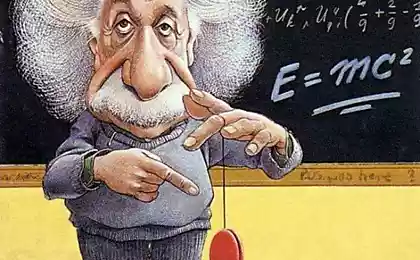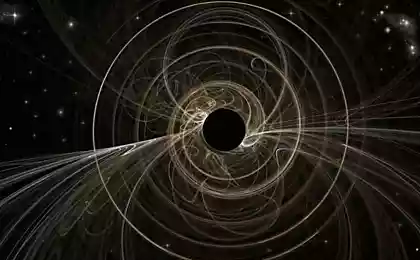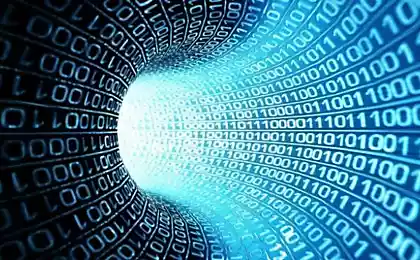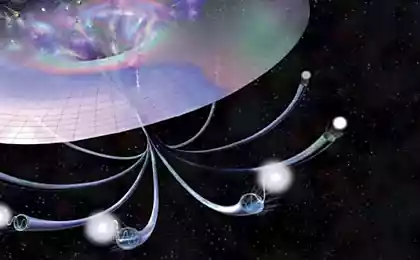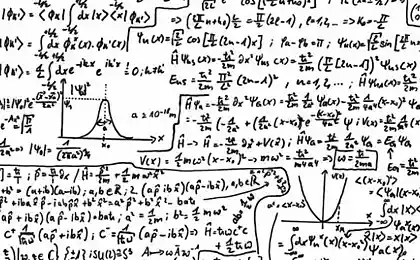510
What are the limits of physics?
Physics interesting effects that manifest at the tiny scale. If not for human curiosity, the world would never have known that snow is composed of molecules. Some scientists are looking for known disturbance forces, others are looking for exotic effects, which may not even exist — changes in the constants of nature, violations of fundamental symmetries... Given the incredible sensitivity of these experiments, it may seem that this game is a bit unfair to nature. But it is not so: physics-experimenters though brilliant in its own way, but there are certain physical limits, which they hope to achieve. Let's place them into three categories: technical limitations, fundamental limitations and philosophical limitations.
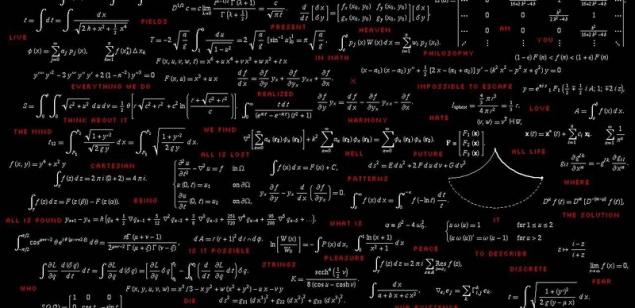
Technical limitations
The weakest of the obstacles in the search for exotic physics is "technical limitations", which mean roughly the following: when some things cannot be achieved in a reasonable time frame using existing technologies. The large hadron Collider is a good example: it pushes the protons together at energies of 13 TeV, not because it is ideal conditions of course of experiment, but because it is a reasonable compromise. Physicists would be happy to play with higher energies, or with the same energies in electron-positron Collider, but both of these maneuver will either be too expensive or impossible given the resources available to us.
These obstacles can be called weak for new physics, because of technical limitations have the property that they overcome the slow-and-steady progress or thanks to a clever change in the new type of measurements. The recent history of atomic, molecular and optical physics cites excellent examples: search for electric dipole moment of the electron was continued for many years, and for many years the best measure was based on the study of atoms of thallium. Experiments are slowly gaining sensitivity because constantly had to deal with the technical limitations of the laboratory is the measurement sensitivity was determined by the size of the electric field can be applied to the electron, and its value was determined by the feasibility (and safety).
However, over the past few years, the thallium limit has been surpassed, first, in the experiment of 2011 by a group of ed Hinds in London, and then a group of Harvard and Yale University. Rapid progress was made possible due to the transition to another method: instead of looking into atoms, new dimensions began to use molecules. Measurements become ten times more sensitive than it was in 2010, and will become even better in the coming years.
Technical limitations, it turns out, are temporary. A specific experiment may be impossible at a certain level of technological development, but in a few years some new technology could start an incredible leap (take at least the invention of the laser), or some smart physicist will come up with a new way to look at old things from a different angle, which does not require the original technological approach.
Fundamental limitationsthe Next step is to do a little more complicated. A fundamental limitation built into the very laws of physics, and there is no way to go around them. If you want to find an exotic effect that contradicts the other, you will hit a dead end.
An example of a fundamental limitation may be the uncertainty principle of Heisenberg. Contrary to current opinion, it does not follow from the measurements, a fundamental limitation imposed by the wave nature of matter (which are struggling to question).
The fact that a quantum object like an electron or photon has a wavelength associated with its momentum, means there is no sense to talk about particles with well defined position and momentum. This does not mean that we are not smart enough to make these measurements: this means that these values will not exist if you try to measure them simultaneously.
Another example of the fundamental constraints include "a theorem on the prohibition of cloning", which shows that it is impossible to make a perfect copy of one quantum system and the mathematical side — gödel's incompleteness theorem shows that any mathematical system sufficiently complex to be true, always will allow to formulate a position, the truth of which cannot be determined. These prohibitions are sealed in a deep mathematical structure of the Universe, and there is nothing that will help you to avoid them.
There is an interesting grey area between technological and fundamental limits, called the "Planck scale". You can build many units of physical measurements, by combining Planck's constant, speed of light, gravitational constant and the Coulomb constant. These "Planck units" determine the standards of time, length and energy, which in some way are fundamental to physics, is known to us, and physics is sometimes called the "Planck scale" a fundamental limitation. May not make sense to even talk about the time intervals that are shorter than the Planck time, or energies that are more Planck energy. On the other hand, it may be a technical limitation of another type — the Planck scale may hide an even deeper theory, after the discovery of which we can talk about the unimaginably small lengths or unimaginably high energies, and even explore them with the help of cool experiments.
Philosophical limitations ofthe Latter category is either the most interesting or, on the contrary, uninteresting, depending on your relationship to philosophy. These restrictions lie at the basis of the principles of science as attempts to define the nature of reality inside of our Universe.
In a sense, the fundamental problem here is a hidden assumption of our feature fundamental limitations as "baked in a deep mathematical structure of the Universe." This implication itself implies the existence of a deep mathematical structure. Eugene Wigner's famous dubbed this issue "the unreasonable effectiveness of mathematics" — empirically establishes that every natural phenomenon is verified by simple mathematical rules, but why should it be right?
From a more experimental point of view, a similar problem manifests itself with uniqueness. Science is based around recurring events, and there's nothing we can do with single events such as signal WOW! (unexplained radio signal supposedly sent to us by aliens). In the absence of the ability to explore a variety of manifestations a particular event or type of event, there is no reasonable way to build a scientific theory to explain them.
In both cases, the main problem is that the structure of science depends on the assumption that the universe will behave in a repeatable and logical manner, but there are no obvious reasons why she shouldn't behave this way. It is possible to imagine a Universe in which we only think that our measurements indicate a consistent set of mathematical laws governing the Universe, but this apparent pattern may be an illusion.
This philosophical approach can either challenge our view of reality, or to inspire in us the boldness of style "well, well, what now?". Scientists are inclined to believe that even if our mathematical model will be an illusion, it in fact will not change. This is a question from discharge "what if free will is illusory?" and "and do we not live in the matrix?". What's next? There's no reasonable way (as far as we know) to test any of these assumptions, therefore, it remains to further test the Universe for strength and to improve our (illusory) scientific model. Life is too short to wonder, they say, is pulling anyone's strings? published
P. S. And remember, only by changing their consumption — together we change the world! ©
Source: hi-news.ru

Technical limitations
The weakest of the obstacles in the search for exotic physics is "technical limitations", which mean roughly the following: when some things cannot be achieved in a reasonable time frame using existing technologies. The large hadron Collider is a good example: it pushes the protons together at energies of 13 TeV, not because it is ideal conditions of course of experiment, but because it is a reasonable compromise. Physicists would be happy to play with higher energies, or with the same energies in electron-positron Collider, but both of these maneuver will either be too expensive or impossible given the resources available to us.
These obstacles can be called weak for new physics, because of technical limitations have the property that they overcome the slow-and-steady progress or thanks to a clever change in the new type of measurements. The recent history of atomic, molecular and optical physics cites excellent examples: search for electric dipole moment of the electron was continued for many years, and for many years the best measure was based on the study of atoms of thallium. Experiments are slowly gaining sensitivity because constantly had to deal with the technical limitations of the laboratory is the measurement sensitivity was determined by the size of the electric field can be applied to the electron, and its value was determined by the feasibility (and safety).
However, over the past few years, the thallium limit has been surpassed, first, in the experiment of 2011 by a group of ed Hinds in London, and then a group of Harvard and Yale University. Rapid progress was made possible due to the transition to another method: instead of looking into atoms, new dimensions began to use molecules. Measurements become ten times more sensitive than it was in 2010, and will become even better in the coming years.
Technical limitations, it turns out, are temporary. A specific experiment may be impossible at a certain level of technological development, but in a few years some new technology could start an incredible leap (take at least the invention of the laser), or some smart physicist will come up with a new way to look at old things from a different angle, which does not require the original technological approach.
Fundamental limitationsthe Next step is to do a little more complicated. A fundamental limitation built into the very laws of physics, and there is no way to go around them. If you want to find an exotic effect that contradicts the other, you will hit a dead end.
An example of a fundamental limitation may be the uncertainty principle of Heisenberg. Contrary to current opinion, it does not follow from the measurements, a fundamental limitation imposed by the wave nature of matter (which are struggling to question).
The fact that a quantum object like an electron or photon has a wavelength associated with its momentum, means there is no sense to talk about particles with well defined position and momentum. This does not mean that we are not smart enough to make these measurements: this means that these values will not exist if you try to measure them simultaneously.
Another example of the fundamental constraints include "a theorem on the prohibition of cloning", which shows that it is impossible to make a perfect copy of one quantum system and the mathematical side — gödel's incompleteness theorem shows that any mathematical system sufficiently complex to be true, always will allow to formulate a position, the truth of which cannot be determined. These prohibitions are sealed in a deep mathematical structure of the Universe, and there is nothing that will help you to avoid them.
There is an interesting grey area between technological and fundamental limits, called the "Planck scale". You can build many units of physical measurements, by combining Planck's constant, speed of light, gravitational constant and the Coulomb constant. These "Planck units" determine the standards of time, length and energy, which in some way are fundamental to physics, is known to us, and physics is sometimes called the "Planck scale" a fundamental limitation. May not make sense to even talk about the time intervals that are shorter than the Planck time, or energies that are more Planck energy. On the other hand, it may be a technical limitation of another type — the Planck scale may hide an even deeper theory, after the discovery of which we can talk about the unimaginably small lengths or unimaginably high energies, and even explore them with the help of cool experiments.
Philosophical limitations ofthe Latter category is either the most interesting or, on the contrary, uninteresting, depending on your relationship to philosophy. These restrictions lie at the basis of the principles of science as attempts to define the nature of reality inside of our Universe.
In a sense, the fundamental problem here is a hidden assumption of our feature fundamental limitations as "baked in a deep mathematical structure of the Universe." This implication itself implies the existence of a deep mathematical structure. Eugene Wigner's famous dubbed this issue "the unreasonable effectiveness of mathematics" — empirically establishes that every natural phenomenon is verified by simple mathematical rules, but why should it be right?
From a more experimental point of view, a similar problem manifests itself with uniqueness. Science is based around recurring events, and there's nothing we can do with single events such as signal WOW! (unexplained radio signal supposedly sent to us by aliens). In the absence of the ability to explore a variety of manifestations a particular event or type of event, there is no reasonable way to build a scientific theory to explain them.
In both cases, the main problem is that the structure of science depends on the assumption that the universe will behave in a repeatable and logical manner, but there are no obvious reasons why she shouldn't behave this way. It is possible to imagine a Universe in which we only think that our measurements indicate a consistent set of mathematical laws governing the Universe, but this apparent pattern may be an illusion.
This philosophical approach can either challenge our view of reality, or to inspire in us the boldness of style "well, well, what now?". Scientists are inclined to believe that even if our mathematical model will be an illusion, it in fact will not change. This is a question from discharge "what if free will is illusory?" and "and do we not live in the matrix?". What's next? There's no reasonable way (as far as we know) to test any of these assumptions, therefore, it remains to further test the Universe for strength and to improve our (illusory) scientific model. Life is too short to wonder, they say, is pulling anyone's strings? published
P. S. And remember, only by changing their consumption — together we change the world! ©
Source: hi-news.ru
